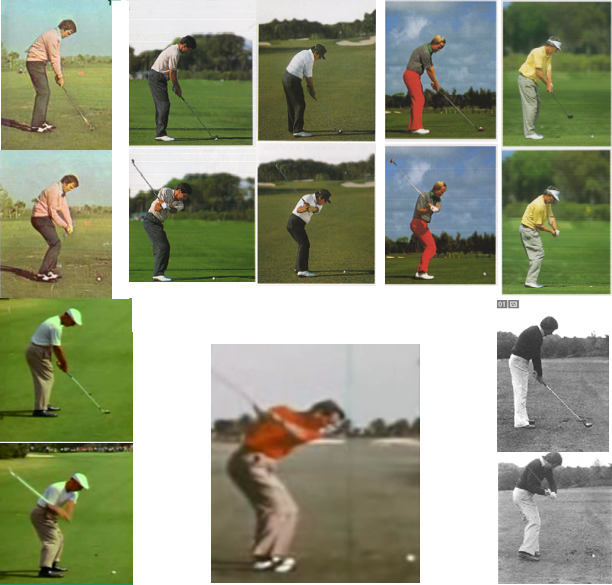
This collage was done to show 'vertical ground pressures.'
As you can see in each pic, each golfer has noticeably more knee bend on the downswing than they had at address. Or as Mike Maves likes to say, these golfers are 'making themselves shorter' on the downswing. This shows golfers using ground forces because they are essentially 'gripping' the ground and pushing off the ground so they can get a little more power in their pivot.
One of the things I've noticed about ground pressures and ground forces talk is that it's come from 4 'prominent instructors.'
- Sean Foley
- Shawn Clement
- Mike Maves
- Mike Bennett
I do not find it to be a coincidence that the first three instructors are all Canadians.
Why?
Because hockey is the favorite sport of Canada (the national sport of Canada is actually lacrosse), it's very important to be able to stabilize the feet when hitting a slap shot. And my guess is that all three Canadian instructors have played hockey at some point in their life and understand how hard it is to power a slap shot when on skates. So why not apply that to golf?
And Mike Bennett, who along with Andy Plummer teaches the S&T golf swing, grew up near the Finger Lakes area of New York and was good friends with PGA Tour golfer Tom Scherrer who was raised in Skaneateles, NY. Scherrer was an excellent hockey player in high school and was the first person to use the Stack and Tilt pattern on the PGA Tour.
3JACK
Richie,
ReplyDeleteIts funny you bring this up. There is a guy on youtube that puts tons of slo mo swings from the tour up that he takes himself, maybe a Euro TV guy or something...anyway I was watching all of them to see how they transition because one of the holes in my swing is a little over the top move to get steep but then I save it by going down under the plane rather than the typical slicers mistake.
What I noticed in these videos is that every one of them has a pronounced sit down and make themselves shorter while shifting the weight left and rotating. I know this is not exactly ground forces that you are talking about but the "move" is the same.
Everyone talks about staying on plane, hula hips, tracing plane lines but I don't recall a lot of instruction on this sit down move, other than from Clement. He talks about the move comes from "behind" you in one of the videos, think its titled "proper weight shift".
I'll have to look into that video. I remember a Manzella video where he talks about the 'squat' and says it's not quite what it appears. My ballstriking has been getting better and better recently and in about a week I may post some findings and thoughts on what I've done differently.
ReplyDeleteHere it is, downswing weight shift
ReplyDeletehttp://www.youtube.com/watch?v=0CSHqnYNijw
Doesn't The Golfing Machine call this a snare (bobbing)? Seems like quite an oversight seeing that so many great players make this move.
ReplyDeleteEmmett - This is probably one of my biggest complaints about TGM, the 'stationary head.' No golfer in the world has a perfectly stationary head. It just doesn't happen. I think having a 'steady' head is probably a better description of an 'essential' to the golf swing.
ReplyDeleteBobbing is more of an excessive *head* dip, not a bending of the knees on the downswing. Although if you are bobbing, it's usually a faulty movement of the knees or the back. But I don't consider bobbing a slight movement downward of the head as long as the rest of the body is doing down slightly as well.
From YODA:
ReplyDeleteHOMER KELLEY viewed the Stationary Head as a geometric ideal, not as a mechanical absolute. He recognized our humanity. Hence, his advice: "Just keep it as still as you can."
Ahhh, did not know that Kev. Thanks!
ReplyDelete